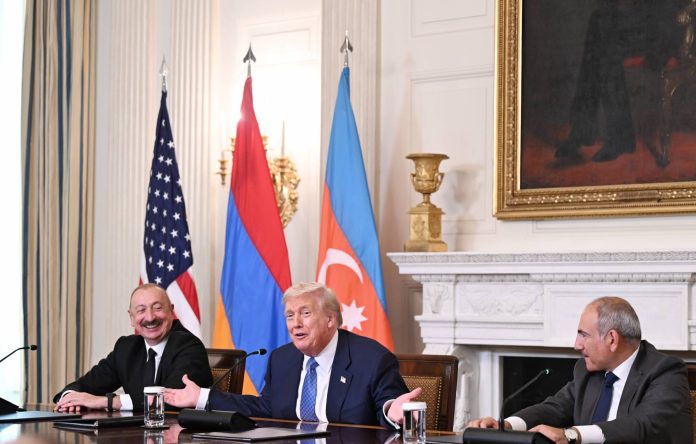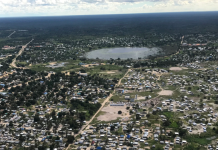As it is already known, a tripartite meeting of the leaders of Azerbaijan, Armenia and the USA took place in Washington on August 8, after which Nikol Pashinyan and Ilham Aliyev signed a joint declaration with the patronage of Donald Trump. A separate point of the declaration is dedicated to the opening of transport communications and ensuring unhindered communication between the main territory of Azerbaijan and the Nakhichevan Autonomous Republic. A special project “Trump Route for International Peace and Prosperity” (TRIPP) will be implemented in the territory of Armenia, which envisages US assistance in securing this route. In fact, Armenia is granting the United States exclusive rights to develop the transit corridor on a long-term basis, for 99 years, the route will be operated in accordance with Armenian law, and the United States will sublease the land to a consortium for infrastructure and management. In other words, TRIPP will create a transit route to southern Armenia, ensuring Azerbaijan’s unhindered access to Nakhichevan. Moreover, it is planned that the transit corridor will eventually include a railway line, oil and gas pipelines, as well as fiber optic cable lines, which will allow for the transport of goods, and later also people.
Several international media and political centers hastened to call this tripartite meeting and the reached agreements a “historic breakthrough” and the beginning of a new peace era in the South Caucasus.
Meanwhile, the question is whether this agreement, signed in Washington under the auspices of Donald Trump, will actually contribute to stability, or whether, on the contrary, it may become a source of new tensions in the region?
Change of key political players in the region
First of all, let’s record that the Washington meeting signaled the changes in the starting line-up of political players in the South Caucasus.
For years, the southern Caucasus has been considered a zone of influence of Russia and Iran. The formation of the corridor makes it an object of international control, with high risks of becoming a future “cause for war.” The issue of whether or not to have a corridor/road for Azerbaijan in Armenia arose with point 9 of the Artsakh settlement agreement signed on November 9, 2020. Point 9 is about an “uninterrupted” road between the eastern and western (Nakhichevan) regions of Azerbaijan, passing through Armenia (presumably through Syunik region). Azerbaijan and Turkey interpreted it as a “Zangezour corridor”. Then, various comments about the “uninterrupted” road proliferated.
There are concerns that the implications of the Washington Declaration will go beyond the scope of bilateral relations. The point is that Russia, which in 1997 signed a strategic treaty guaranteeing Armenia’s territorial integrity, is gradually losing its influence in the South Caucasus, weakened by the war in Ukraine and its ambiguous policy. Inherently, both Iran and Russia will not put up with the created complex regional situation. In recent years, Iran has been clearly declaring that the land connection between Iran and Armenia is a red line for their policy. The idea of a corridor passing through Syunik, regardless of how it is called – “corridor”, “TRIPP”, or “route”, is perceived by the Iranian side as an attempt to isolate Iran and strengthen the Turkish-Azerbaijani transport vector at the expense of Iran. And this already means a threat to Iran, economically, politically and even militarily. Immediately after the Washington meeting, threatening statements were made by Iran’s high-ranking officials.
Iran’s Foreign Minister Abbas Araghchi once again reminded Iran’s position that they will not accept any change of international borders.
Commenting on the Washington agreements, former Foreign Minister Ali Akbar Velayati, advisor to Iran’s Supreme Leader on foreign policy, noted that “Iran will block the American corridor to the Caucasus, with or without Russia.”
And the Guards Corps of the Islamic Revolution has sent another warning, from General Yadulla Javani to Azerbaijan and Armenia: “We are ready to repeat the fate of Ukraine for you.” A top adviser to Iran’s Supreme Leader Ayatollah Ali Khamenei wrote on X, specifically emphasizing: ” The Islamic Republic will not tolerate policies or plans that lead to the closing of the Iran-Armenia border.”
Russia’s reaction is far more ambiguous than Iran’s. Russian Foreign Ministry spokeswoman Maria Zakharova welcomed the Washington agreements and noted that Russia will additionally analyze the Washington statements concerning the unlocking of regional communications, at the same time reminding that “the tripartite agreements with Moscow’s participation are still in force.”
Russia can play behind-the-scenes diplomacy with Turkey, as it has done several times before. Of course, at this moment, Russia does not showcase the same determination as Iran, but it does not want to lose its foothold in the Syunik region. On the other hand, there is a possibility of an internal tacit agreement in exchange for the Western agreement, if it receives some compensation on other fronts, for example, in the issues of Ukraine.
Turkish President Erdogan called the Washington Agreement a historic step towards long-term peace in the South Caucasus.
The fact is that Turkey is in a winning position in this scenario. The US-brockered TRIPP program, regardless of its name, will make Turkey the most beneficial connection in the region to Azerbaijan and Central Asia, bypassing Iran. That is, the Pan-Turanian idea promoted by Erdogan is actually entrenched. Turkey could also persuade Russia not to block the process, allowing Russian economic or energy interests to flow into Turkey and then into Europe.
The fact that a very complex geopolitical atmosphere has been formed in the South Caucasus, and that deals are possible here, is undeniable, for instance, Russia-Turkey, US-Turkey, even US-Iran.
Risks of losing Armenia’s sovereignty
And what will the Washington agreements bring to Armenia? First, let us be noted that the Washington Agreement does not address the issue of the release of Armenian prisoners of war held in Azerbaijan, nor the rights of the population of Karabakh, who have become victims of ethnic cleansing. Instead, it almost completely repeats Baku’s main demands, including the revision of the Armenian Constitution and the dissolution of the Minsk Group, which was the only international format where this conflict was still being discussed. After the negotiations between the leaders of Armenia, the USA and Azerbaijan in Washington, a group of European Parliament members issued a statement emphasizing the need to solve the issue of Armenian prisoners in Azerbaijan and the unresolved problems of the displaced Karabakh Armenians, as well as the need for the complete withdrawal of Azerbaijani forces from the territory of the Republic of Armenia in the near future.
What some are hailing as a step toward peace could become a source of long-term instability for Armenia and a dangerous precedent for its sovereignty. This belief is specifically shared by the Armenian opposition. In this regard, the assessments of the Armenian government and the opposition regarding the agreements reached in Washington are diametrically different. The Armenian opposition is reassured that the joint statement signed in Washington by the USA, Armenia, and Azerbaijan not only does not reflect the state and national interests of the Republic of Armenia, but is also a blow to Armenia’s sovereignty. According to their statements, these agreements create new security challenges and threats, disrupt the military-political balance of the region and the territorial integrity of the Republic of Armenia, calling into question the existence of the Republic of Armenia’s statehood.
The authorities assure that the principles of territorial integrity, sovereignty, jurisdiction and reciprocity, which are important for Armenia, will be preserved with that declaration.
Armenia’s Prime Minister Pashinyan also emphasized in the press conference after the meeting that whatever solutions there are in the future, around which there will be conversations, negotiations, details, they should be placed within the framework of sovereignty, territorial integrity and jurisdiction, and the principle of reciprocity should work.
While the Armenian authorities are euphorically presenting the Washington Declaration and considering it a great achievement, American expert circles see great dangers hidden behind it and consider it, first of all, American interference in the Caucasus region. Former US State Department advisor James W. Carden believes that Trump is doing this to somehow win a Nobel Prize, but following Iran’s reactions, it turns out that this agreement not only does not lead to peace, but also does the exact opposite. According to Carden, the next danger is whether the signing of this declaration will push Armenia and Azerbaijan towards NATO membership. “This is a very important issue that will, of course, cross red lines for Iran and Russia. If Pashinyan tries to lead Armenia to NATO, a terrible regional war will take place. Pro-Western and anti-Western forces will clash: Russia and Iran on one side, Turkey and NATO on the other. That would be very dangerous for Armenia, and in that case, the scenario of Ukraine or Syria could be repeated”, believes James W. Carden.
American economist and Columbia University professor Jeffrey Sachs also believes that the actions taken by the United States in the South Caucasus are destabilizing and extremely dangerous. “Don’t believe that the United States, especially under Donald Trump, will somehow save you from your neighbors. They will get you into serious troubles. The USA is not interested in the South Caucasus at all, it plays other games”, Jeffrey Sachs warns.
Armenian expert circles believe that the US-brockered document, in addition to geopolitical and regional peculiarities, also has domestic political peculiarities: with this, Pashinyan will try to be re-elected in the parliamentary elections expected in 2026. Pashinyan needs any paper that he can “sell” inside the country, to his voters, the citizens of Armenia, as a peace treaty, as a guarantee of peace.
Meanwhile, the majority of Armenian society does not believe in the possibility of peace between Azerbaijan and Armenia. Surveys conducted in different months during the last year show that, in fact, at least 2/3 of the Armenian society does not see the prospect of long-term peace. Thus, according to the latest phone survey by the ARAR Foundation, about 65% of Armenians do not believe that a stable and lasting peace can be achieved through negotiations with Azerbaijan. Only 34% consider achieving peace as possible.

















